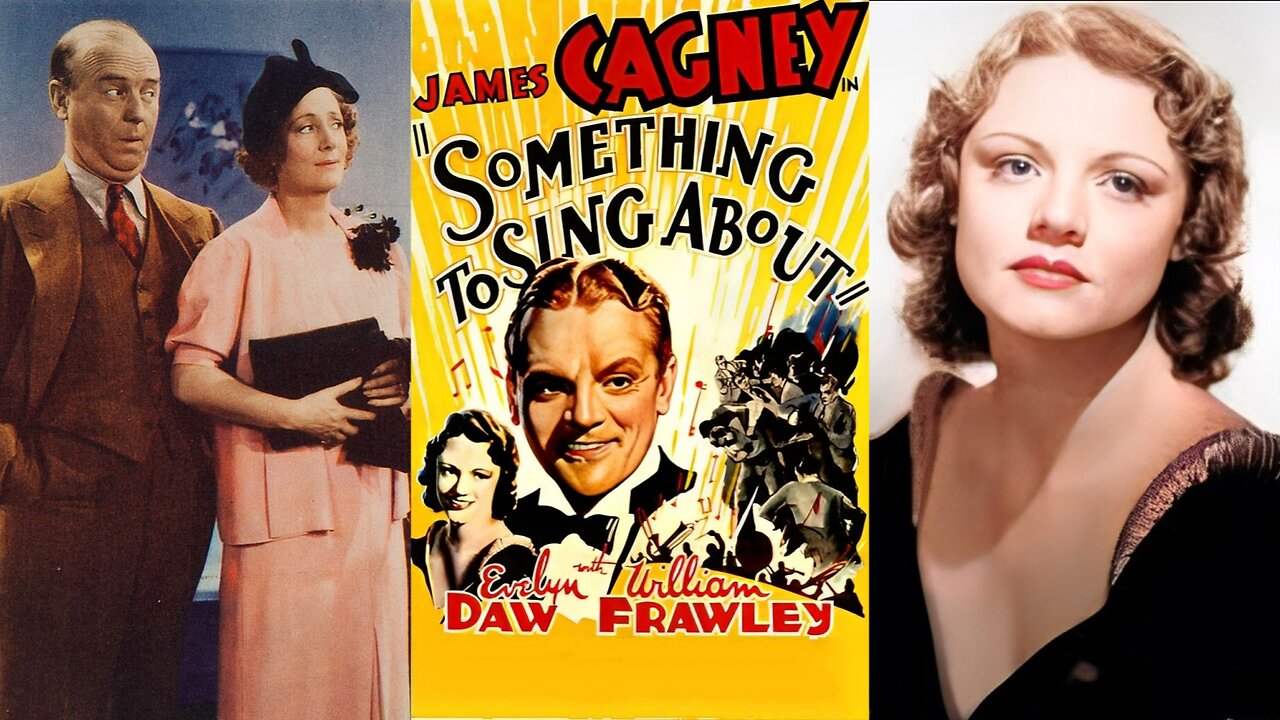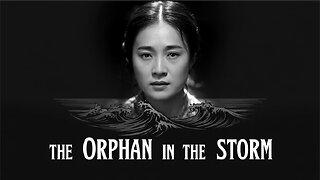Premium Only Content

SOMETHING TO SING ABOUT (1937) James Cagney, Evelyn Daw & William Frawley | Comedy, Musical | B&W
Something to Sing About (1937), re-released in 1947 as Battling Hoofer, is the second and final film James Cagney made for Grand National Pictures – the first being Great Guy – before mending relations with and returning to Warner Bros. It is one of the few films besides Footlight Parade and Yankee Doodle Dandy to showcase Cagney's singing and dancing talents. It was directed by Victor Schertzinger, who also wrote the music and lyrics of the original songs, as well as the story that Austin Parker's screenplay is based on. Cagney's co-stars are Evelyn Daw and William Frawley, and the film features performances by Gene Lockhart and Mona Barrie.
The film, which is a satire on the movie industry's foibles, flopped in theaters, causing the just recently started "Poverty Row" independent Grand National, which had gone significantly overbudget making the film, to close its doors in 1940.
When, at 80 years of age, Cagney was asked which of his films – outside of Yankee Doodle Dandy – that he'd like to see again, this was the film he chose. Since the copyright on the film was not renewed in 1965, the film is now in the public domain in the United States.
SYNOPSIS
A New York bandleader journeys to Hollywood when he is offered a contract with a studio, but he is determined to do things his way and not theirs.
"Terry Rooney" (James Cagney) is the stage name of Thaddeus McGillicuddy, a popular New York band leader and hoofer with a radio show, who gets an offer to go to Hollywood to make movies. He leaves behind his fiancée, the band's singer, Rita Wyatt (Evelyn Daw), and finds himself in the hands of studio boss B.O. Regan (Gene Lockhart), who sets a team of studio professionals to mold Rooney into a star. Regan, after struggling with another new talent who quickly developed an uncontrollable ego, also secretly insists that no one praise Rooney's work, on pain of being fired.
While shooting a bar fight for his first film, a stunt man who is supposed to throw a fake punch at Rooney hits him deliberately instead. Rooney retaliates, and a full-out fistfight breaks out. Disgusted with Hollywood, Rooney leaves to marry Wyatt, and for a honeymoon takes her on a tramp steamer for a cruise to the South Seas, ending up in San Francisco.
While they are away, the film is completed and premiered, and becomes a huge hit – but, to Regan's dismay, nobody in the studio knows where Rooney is. When he is finally spotted in San Francisco, Regan flies out immediately with a contract, a clause of which requires Rooney to remain single for its seven-year duration. Rooney and Wyatt agree to keep their relationship quiet, with Wyatt posing as Rooney's secretary.
Another film is begun, with Rooney acting alongside Stephanie Hajos (Mona Barrie), and to promote it, studio publicist Hank Meyers (William Frawley) plants news stories saying that Rooney and Hajos are love interests off-screen.
CAST & CREW
James Cagney as Thadeus McGillicuddy, aka Terrence "Terry" Rooney
Evelyn Daw as Rita Wyatt
William Frawley as Hank Meyers
Mona Barrie as Stephanie "Steffie" Hajos
Gene Lockhart as Bennett O. "B.O." Regan
Philip Ahn as Ito, Terry's man-servant
Marek Windheim as Mr. Farney, dialogue director
Dwight Frye as Mr. Easton, makeup supervisor
Johnny Arthur as Mr. Daviani, wardrobe supervisor
William B. Davidson as Mr. Richards, nightclub owner
Richard Tucker as Mr. Blaine, the director
Kathleen Lockhart as Miss Amy Robbins, newspaper columnist
James Newill as Jimmy, band member
Harry Barris as Pinky, pianist in the band
Cully Richards as Cully, band member
Directed by Victor Schertzinger
Written by Victor Schertzinger (story), Austin Parker (screenplay)
Produced by Zion Meyers
Cinematography John Stumar
Edited by Gene Milford
Music by Myrl Alderman. Victor Schertzinger (songs)
Production company Zion Meyers Productions
Distributed by Grand National Pictures
Release date September 30, 1937 (United States)
Running time 93 minutes, 89 minutes
Country United States
Language English
Budget $900,000, ($14.8 million in 2015)
NOTES
Although the critical response was generally favorable, the film could not overcome the lack of wide distribution caused by its release by a newly formed independent company bucking a system dominated by the major studios. With no breakout songs in the not very memorable score, there was little chance of the film succeeding.
Something to Sing About was re-released in 1947 by Screencraft Pictures under the title Battling Hoofer.
Victor Schertzinger and the film's music director, Constantin Bakaleinikoff were nominated for a 1937 Academy Award for "Best Music (Scoring)", along with 13 other films. The award was won by One Hundred Men and a Girl.
-
 1:15:40
1:15:40
Lost n Found Films
3 days agoTHE ORPHAN OF THE STORM (1929) Suxin Wu, Huimin Zhang & Langen Han | Drama |Cinema Gem
1362 -
 2:05:30
2:05:30
Side Scrollers Podcast
18 hours agoEveryone Hates MrBeast + FBI Spends $140k on Pokemon + All Todays News | Side Scrollers Live
96.5K8 -
 11:06
11:06
The Pascal Show
12 hours ago $0.46 earned'THEY'RE GETTING DEATH THREATS!' Jake Haro's Lawyer Breaks Silence On Emmanuel Haro's Disappearance!
4.67K -
 LIVE
LIVE
Lofi Girl
2 years agoSynthwave Radio 🌌 - beats to chill/game to
410 watching -
 2:19:32
2:19:32
Badlands Media
1 day agoDEFCON ZERO Ep. 005: False Flags, Cyber Fronts & Global Power Plays
140K57 -
 2:35:23
2:35:23
FreshandFit
7 hours agoWhy Black Men Don't Date Black Women Debate
32.5K32 -
 2:03:42
2:03:42
Inverted World Live
11 hours agoBigfoot Corpse Coming to the NY State Fair | Ep. 94
104K24 -
 6:16:23
6:16:23
SpartakusLIVE
12 hours ago$1,000 Pistol Challenge || #1 ENTERTAINER of The EONS Eradicates BOREDOM
80.3K2 -
 2:33:37
2:33:37
TimcastIRL
9 hours agoTrump Orders Review of Smithsonian For Being Woke & Out of Control | Timcast IRL
182K74 -
 3:09:10
3:09:10
Barry Cunningham
12 hours agoPRESIDENT TRUMP HAS TAKEN THE MONSTER AWAY FROM THE LEFT! HORROR STORIES WON'T WORK ANYMORE!
81.6K80